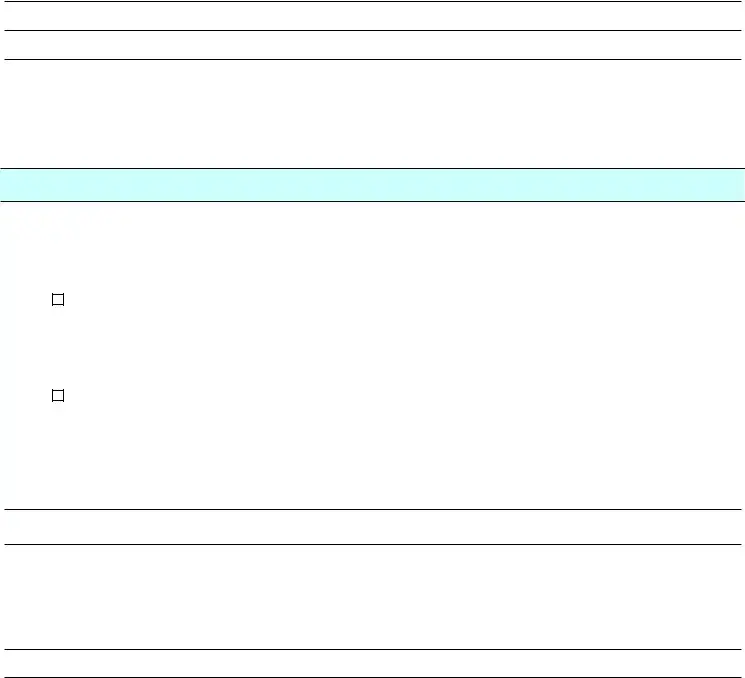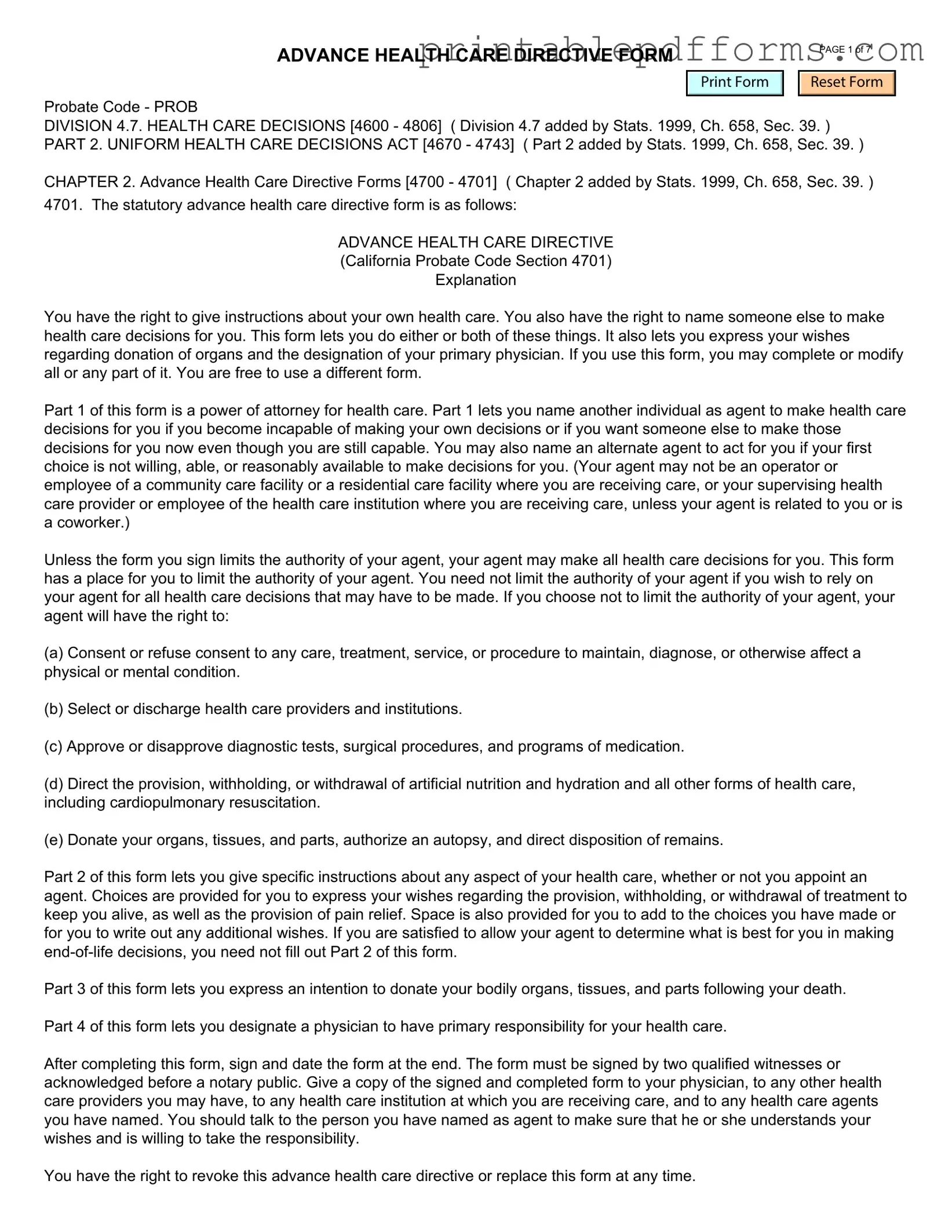Fill a Valid California Advanced Health Care Directive Form
In the realm of healthcare decision-making, the California Advanced Health Care Directive form serves as a vital tool for individuals seeking to assert their preferences regarding medical treatment in the event they become unable to communicate their wishes. This comprehensive document allows a person to appoint a trusted individual, often referred to as a healthcare agent, who will make medical decisions on their behalf. Additionally, the form provides an opportunity to outline specific desires concerning life-sustaining treatments, such as resuscitation efforts and artificial nutrition. By clearly articulating these preferences, individuals can ensure that their values and beliefs guide their care, even when they are not in a position to voice them. The directive also addresses the importance of discussing one’s wishes with family members and healthcare providers, fostering a collaborative approach to end-of-life care. Ultimately, this form empowers individuals, promoting autonomy and dignity during some of life’s most challenging moments.
Additional PDF Templates
Schedule of Availability Template - Indicate if you can adjust your availability as needed.
To create a well-structured LLC, having an Operating Agreement is essential, and you can find useful resources and templates to assist you in this process on freebusinessforms.org, ensuring that your operational procedures are clearly defined and tailored to meet your specific needs.
Notarized Consent Form - This form is part of Royal Caribbean's commitment to passenger safety.
Similar forms
- Durable Power of Attorney for Health Care: This document allows individuals to designate someone to make medical decisions on their behalf if they become unable to do so. Like the Advanced Health Care Directive, it focuses on health care decisions and can outline specific wishes regarding treatment.
- Living Will: A living will provides instructions about the types of medical treatment a person wishes to receive or avoid in case they become incapacitated. It shares similarities with the Advanced Health Care Directive in that both documents express a person's preferences regarding end-of-life care.
- Do Not Resuscitate (DNR) Order: A DNR order instructs medical personnel not to perform CPR if a person stops breathing or their heart stops. While the Advanced Health Care Directive can include such wishes, a DNR is a more specific directive focused solely on resuscitation efforts.
- Physician Orders for Life-Sustaining Treatment (POLST): POLST is a medical order that outlines a patient’s preferences for life-sustaining treatments. Similar to the Advanced Health Care Directive, it is intended for individuals with serious health conditions, ensuring their wishes are followed in emergencies.
- Health Care Proxy: This document designates a person to make health care decisions for someone who is unable to communicate their wishes. It parallels the Advanced Health Care Directive by emphasizing the importance of having a trusted individual advocate for a person’s health care preferences.
- Trailer Bill of Sale: This form is essential for those looking to buy or sell trailers in Georgia, ensuring a smooth transaction process and providing legal proof of ownership transfer. For more details, visit georgiapdf.com/trailer-bill-of-sale.
- Mental Health Advance Directive: This directive allows individuals to express their preferences for mental health treatment in case they become unable to communicate. Like the Advanced Health Care Directive, it ensures that a person’s wishes are respected during critical times.
Document Example

ADVANCE HEALTH CARE DIRECTIVE FORM |
|
PAGE 1 of 7 |
|
|
|
|
|
|
|
|
|
|
Print Form |
|
Reset Form |
Probate Code - PROB
DIVISION 4.7. HEALTH CARE DECISIONS [4600 - 4806] ( Division 4.7 added by Stats. 1999, Ch. 658, Sec. 39. ) PART 2. UNIFORM HEALTH CARE DECISIONS ACT [4670 - 4743] ( Part 2 added by Stats. 1999, Ch. 658, Sec. 39. )
CHAPTER 2. Advance Health Care Directive Forms [4700 - 4701] ( Chapter 2 added by Stats. 1999, Ch. 658, Sec. 39. )
4701. The statutory advance health care directive form is as follows:
ADVANCE HEALTH CARE DIRECTIVE
(California Probate Code Section 4701)
Explanation
You have the right to give instructions about your own health care. You also have the right to name someone else to make health care decisions for you. This form lets you do either or both of these things. It also lets you express your wishes regarding donation of organs and the designation of your primary physician. If you use this form, you may complete or modify all or any part of it. You are free to use a different form.
Part 1 of this form is a power of attorney for health care. Part 1 lets you name another individual as agent to make health care decisions for you if you become incapable of making your own decisions or if you want someone else to make those decisions for you now even though you are still capable. You may also name an alternate agent to act for you if your first choice is not willing, able, or reasonably available to make decisions for you. (Your agent may not be an operator or employee of a community care facility or a residential care facility where you are receiving care, or your supervising health care provider or employee of the health care institution where you are receiving care, unless your agent is related to you or is a coworker.)
Unless the form you sign limits the authority of your agent, your agent may make all health care decisions for you. This form has a place for you to limit the authority of your agent. You need not limit the authority of your agent if you wish to rely on your agent for all health care decisions that may have to be made. If you choose not to limit the authority of your agent, your agent will have the right to:
(a)Consent or refuse consent to any care, treatment, service, or procedure to maintain, diagnose, or otherwise affect a physical or mental condition.
(b)Select or discharge health care providers and institutions.
(c)Approve or disapprove diagnostic tests, surgical procedures, and programs of medication.
(d)Direct the provision, withholding, or withdrawal of artificial nutrition and hydration and all other forms of health care, including cardiopulmonary resuscitation.
(e)Donate your organs, tissues, and parts, authorize an autopsy, and direct disposition of remains.
Part 2 of this form lets you give specific instructions about any aspect of your health care, whether or not you appoint an agent. Choices are provided for you to express your wishes regarding the provision, withholding, or withdrawal of treatment to keep you alive, as well as the provision of pain relief. Space is also provided for you to add to the choices you have made or for you to write out any additional wishes. If you are satisfied to allow your agent to determine what is best for you in making
Part 3 of this form lets you express an intention to donate your bodily organs, tissues, and parts following your death.
Part 4 of this form lets you designate a physician to have primary responsibility for your health care.
After completing this form, sign and date the form at the end. The form must be signed by two qualified witnesses or acknowledged before a notary public. Give a copy of the signed and completed form to your physician, to any other health care providers you may have, to any health care institution at which you are receiving care, and to any health care agents you have named. You should talk to the person you have named as agent to make sure that he or she understands your wishes and is willing to take the responsibility.
You have the right to revoke this advance health care directive or replace this form at any time.

ADVANCE HEALTH CARE DIRECTIVE FORM
PAGE 2 of 7
PART 1
POWER OF ATTORNEY FOR HEALTH CARE
(1.1) DESIGNATION OF AGENT: I designate the following individual as my agent to make health care decisions for me:
(name of individual you choose as agent)
(address) |
(city) |
(state) |
(ZIP Code) |
||
|
|
|
|
|
|
(home phone) |
(work phone) |
|
|
||
OPTIONAL: If I revoke my agent's authority or if my agent is not willing, able, or reasonably available to make a health care decision for me, I designate as my first alternate agent:
(name of individual you choose as first alternate agent)
(address) |
(city) |
(state) |
(ZIP Code) |
||
|
|
|
|
|
|
(home phone) |
(work phone) |
|
|
||
OPTIONAL: If I revoke the authority of my agent and first alternate agent or if neither is willing, able, or reasonably available to make a health care decision for me, I designate as my second alternate agent:
(name of individual you choose as second alternate agent)
(address) |
(city) |
(state) |
(ZIP Code) |
||
|
|
|
|
|
|
(home phone) |
(work phone) |
|
|
||
(1.2) AGENT'S AUTHORITY: My agent is authorized to make all health care decisions for me, including decisions to provide, withhold, or withdraw artificial nutrition and hydration and all other forms of health care to keep me alive, except as I state here:
(Add additional sheets if needed.)
(1.3) WHEN AGENT'S AUTHORITY BECOMES EFFECTIVE: My agent's authority becomes effective when my primary physician determines that I am unable to make my own health care decisions unless I mark the following box.
If I mark this box  , my agent's authority to make health care decisions for me takes effect immediately.
, my agent's authority to make health care decisions for me takes effect immediately.

ADVANCE HEALTH CARE DIRECTIVE FORM
PAGE 3 of 7
(1.4.) AGENT'S OBLIGATION: My agent shall make health care decisions for me in accordance with this power of attorney for health care, any instructions I give in Part 2 of this form, and my other wishes to the extent known to my agent. To the extent my wishes are unknown, my agent shall make health care decisions for me in accordance with what my agent determines to be in my best interest. In determining my best interest, my agent shall consider my personal values to the extent known to my agent.
(1.5) AGENT'S POSTDEATH AUTHORITY: My agent is authorized to donate my organs, tissues, and parts, authorize an autopsy, and direct disposition of my remains, except as I state here or in Part 3 of this form:
:
(Add additional sheets if needed.)
(1.6) NOMINATION OF CONSERVATOR: If a conservator of my person needs to be appointed for me by a court, I nominate the agent designated in this form. If that agent is not wiling, able, or reasonably available to act as conservator, I nominate the alternate agents whom I have named, in the order designated.
PART 2
INSTRUCTIONS FOR HEALTH CARE
If you fill out this part of the form, you may strike any wording you do not want.
(2.1)
(a) Choice Not to Prolong Life
I do not want my life to be prolonged if (1) I have an incurable and irreversible condition that will result in my death within a relatively short time, (2) I become unconscious and, to a reasonable degree of medical certainty, I will not regain consciousness, or (3) the likely risks and burdens of treatment would outweigh the expected benefits, OR
(b) Choice to Prolong Life
I want my life to be prolonged as long as possible within the limits of generally accepted health care standards.
(2.2) RELIEF FROM PAIN: Except as I state in the following space, I direct that treatment for alleviation of pain or discomfort be provided at all times, even if it hastens my death:
(Add additional sheets if needed.)
(2.3) OTHER WISHES: (If you do not agree with any of the optional choices above and wish to write your own, or if you wish to add to the instructions you have given above, you may do so here.) I direct that:
(Add additional sheets if needed.)

|
ADVANCE HEALTH CARE DIRECTIVE FORM |
PAGE 4 of 7 |
|
|
|
|
|
|
|
PART 3 |
|
|
DONATION OF ORGANS, TISSUES, AND PARTS AT DEATH |
|
|
(OPTIONAL) |
|
(3.1) |
Upon my death, I give my organs, tissues, and parts (mark box to indicate yes). |
|
By checking the box above, and notwithstanding my choice in Part 2 of this form, I authorize my agent to consent to any temporary medical procedure necessary solely to evaluate and/or maintain my organs, tissues, and/or parts for purposes of donation.
My donation is for the following purposes (strike any of the following you do not want):
(a)Transplant
(b)Therapy
(c)Research
(d)Education
If you want to restrict your donation of an organ, tissue, or part in some way, please state your restriction on the following lines:
If I leave this part blank, it is not a refusal to make a donation. My
PART 4
PRIMARY PHYSICIAN
(OPTIONAL)
(4.1) I designate the following physician as my primary physician:
(name of physician)
(address) |
(city) |
(state) |
(ZIP Code) |
(phone)
OPTIONAL: If the physician I have designated above is not willing, able, or reasonably available to act as my primary physician, I designate the following physician as my primary physician:
(name of physician)
(address) |
(city) |
(state) |
(ZIP Code) |
(phone)

ADVANCE HEALTH CARE DIRECTIVE FORM
PART 5
PAGE 5 of 7
(5.1) EFFECT OF COPY: A copy of this form has the same effect as the original.
(5.2) SIGNATURE: Sign and date the form here:
(date) |
(sign your name) |
(address) |
(print your name) |
(city) (state)
(5.3) STATEMENT OF WITNESSES: I declare under penalty of perjury under the laws of California (1) that the individual who signed or acknowledged this advance health care directive is personally known to me, or that the individual's identity was proven to me by convincing evidence (2) that the individual signed or acknowledged this advance directive in my presence, (3) that the individual appears to be of sound mind and under no duress, fraud, or undue influence, (4) that I am not a person appointed as agent by this advance directive, and (5) that I am not the individual's health care provider, an employee of the individual's health care provider, the operator of a community care facility, an employee of an operator of a community care facility, the operator of a residential care facility for the elderly, nor an employee of an operator of a residential care facility for the elderly.
First witness |
Second witness |
(print name)
(address)
(city)(state)
(print name)
(address)
(city)(state)
(signature of witness) |
(signature of witness) |
(date) |
(date) |
(5.4) ADDITIONAL STATEMENT OF WITNESSES: At least one of the above witnesses must also sign the following declaration:
I further declare under penalty of perjury under the laws of California that I am not related to the individual executing this advance health care directive by blood, marriage, or adoption, and to the best of my knowledge, I am not entitled to any part of the individual's estate upon his or her death under a will now existing or by operation of law.
(signature of witness) |
(signature of witness) |

ADVANCE HEALTH CARE DIRECTIVE FORM |
PAGE 6 of 7 |
|
PART 6
SPECIAL WITNESS REQUIREMENT
(6.1) The following statement is required only if you are a patient in a skilled nursing
STATEMENT OF PATIENT ADVOCATE OR OMBUDSMAN
I declare under penalty of perjury under the laws of California that I am a patient advocate or ombudsman as designated by the State Department of Aging and that I am serving as a witness as required by Section 4675 of the Probate Code.
(date) |
(sign your name) |
(address) |
(print your name) |
(city) (state) |
|
(Amended by Stats. 2018, Ch. 287, Sec. 1. (AB 3211) Effective January 1, 2019.)

ADVANCE HEALTH CARE DIRECTIVE FORM
PAGE 7 of 7
ACKNOWLEDGMENT
A notary public or other officer completing this certificate verifies only the identity of the individual who signed the document to which this certificate is attached, and not the truthfulness, accuracy, or validity of that document.
State of California,
County of
On |
before me, |
(insert name and title of officer)
personally appeared
who proved to me on the basis of satisfactory evidence to be the person(s) whose name(s) is/are subscribed to the within instrument and acknowledged to me that he/she/they executed the same in his/her/their authorized capacity(ies), and that by his/her/their signature(s) on the instrument the person(s), or the entity upon behalf of which the person
(s) acted, executed the instrument.
I certify under PENALTY OF PERJURY under the laws of the State of California that the foregoing paragraph is true and correct.
WITNESS my hand and official seal.
Signature |
|
(SEAL) |
|
|
|
Form Specs
| Fact Name | Description |
|---|---|
| Purpose | The California Advanced Health Care Directive allows individuals to specify their medical preferences and appoint an agent to make decisions on their behalf if they are unable to do so. |
| Governing Law | This form is governed by the California Probate Code, specifically sections 4600-4800. |
| Agent Appointment | Individuals can appoint a trusted person as their health care agent, who will have the authority to make medical decisions based on the individual's wishes. |
| Specific Instructions | The form allows for detailed instructions regarding medical treatments, including life-sustaining measures and organ donation preferences. |
| Revocation | The directive can be revoked at any time, as long as the individual is mentally competent to do so. |
| Witness Requirements | Two witnesses must sign the directive, or it can be notarized. Witnesses cannot be the appointed agent or related to the individual. |
| Durability | The directive remains effective even if the individual becomes incapacitated, ensuring that their wishes are honored. |
| Accessibility | It is recommended to keep copies of the directive in accessible locations and share them with the appointed agent and healthcare providers. |
Crucial Questions on This Form
What is a California Advanced Health Care Directive?
A California Advanced Health Care Directive is a legal document that allows individuals to outline their healthcare preferences in the event they become unable to communicate their wishes. It combines two important components: a power of attorney for healthcare and a living will. This directive ensures that a person's medical decisions align with their values and desires, even when they cannot voice them.
Who can create an Advanced Health Care Directive in California?
Any adult who is at least 18 years old and of sound mind can create an Advanced Health Care Directive in California. This includes individuals who are capable of understanding the nature and consequences of their healthcare decisions. Minors and individuals who lack the capacity to make informed decisions cannot create this document.
What are the main components of the directive?
The California Advanced Health Care Directive consists of two primary sections:
- Health Care Agent Designation: This section allows individuals to appoint someone they trust to make medical decisions on their behalf if they are unable to do so.
- Health Care Instructions: This section enables individuals to specify their preferences regarding medical treatments, life-sustaining measures, and other healthcare choices.
How do I choose a health care agent?
When selecting a health care agent, consider the following factors:
- Trustworthiness: Choose someone who understands your values and will advocate for your wishes.
- Communication: Select an individual who can effectively communicate your preferences to healthcare providers.
- Availability: Ensure that the person is willing and able to make decisions on your behalf when needed.
Can I change or revoke my Advanced Health Care Directive?
Yes, individuals can change or revoke their Advanced Health Care Directive at any time, as long as they are of sound mind. To make changes, a new directive should be completed and signed. To revoke an existing directive, individuals can simply destroy it or create a written statement indicating the revocation.
Is it necessary to have a lawyer to create this directive?
It is not necessary to hire a lawyer to create a California Advanced Health Care Directive. The form can be completed by individuals on their own. However, consulting with a lawyer may be beneficial for those who have complex medical situations or specific legal questions regarding their directive.
Where should I keep my Advanced Health Care Directive?
It is advisable to keep the original document in a safe but accessible location. Inform your health care agent and close family members about its location. Additionally, consider providing copies to your healthcare providers, hospital, and any other relevant parties to ensure your wishes are known when needed.
What happens if I do not have an Advanced Health Care Directive?
If an individual does not have an Advanced Health Care Directive and becomes unable to make healthcare decisions, medical providers may rely on state laws to determine who can make decisions on their behalf. This could lead to family disputes or decisions that may not align with the individual's personal values or wishes.
Are there any costs associated with creating an Advanced Health Care Directive?
Creating a California Advanced Health Care Directive is generally free if individuals complete the form themselves. However, if legal assistance is sought, there may be associated costs. It is important to weigh the benefits of professional guidance against the potential expenses involved.
Can I include specific medical treatments in my directive?
Yes, individuals can include specific instructions regarding medical treatments in their Advanced Health Care Directive. This may encompass preferences for life-sustaining treatments, pain management, organ donation, and other healthcare decisions. Clearly articulating these preferences can help ensure that healthcare providers respect the individual's wishes.
Documents used along the form
The California Advanced Health Care Directive is an important document that allows individuals to express their healthcare preferences and appoint someone to make medical decisions on their behalf if they become unable to do so. However, there are several other forms and documents that can complement this directive, ensuring that your wishes are clearly communicated and legally recognized. Below is a list of commonly used documents that may be beneficial alongside the Advanced Health Care Directive.
- Durable Power of Attorney for Health Care: This document designates a specific person to make healthcare decisions for you when you are unable to communicate your wishes. It is essential for ensuring that your preferences are respected.
- Living Will: A living will outlines your wishes regarding medical treatment in situations where you are terminally ill or in a persistent vegetative state. It specifies the types of life-sustaining treatments you do or do not want.
- Do Not Resuscitate (DNR) Order: A DNR order instructs medical personnel not to perform CPR if your heart stops or you stop breathing. This document is crucial for those who wish to avoid aggressive resuscitation efforts.
- POLST (Physician Orders for Life-Sustaining Treatment): This medical order translates your treatment preferences into actionable orders for healthcare providers. It is designed for individuals with serious health conditions and is signed by a physician.
- Health Insurance Portability and Accountability Act (HIPAA) Release Form: This form allows you to designate individuals who can access your medical records and information. It ensures that your chosen representatives can make informed decisions on your behalf.
- Financial Power of Attorney: While not directly related to healthcare, this document allows someone to manage your financial affairs if you become incapacitated. It is important for ensuring your financial needs are met.
- Ohio Motorcycle Bill of Sale: This form serves as an essential record for the transfer of motorcycle ownership in Ohio, ensuring legal protection for both buyers and sellers during the transaction. For more details, refer to All Ohio Forms.
- Will: A will outlines how your assets will be distributed after your death. While it does not address healthcare decisions, it is a critical part of planning for your overall estate and ensuring your wishes are followed.
- Trust: A trust can help manage your assets during your lifetime and after your death. It can be a useful tool for avoiding probate and ensuring your wishes regarding asset distribution are honored.
- Healthcare Proxy: Similar to a durable power of attorney for healthcare, this document specifically appoints someone to make medical decisions for you, focusing on your healthcare preferences in particular.
- Advance Directive Registry: This is a service that allows you to register your advance directive so that it is easily accessible to healthcare providers when needed. It helps ensure your preferences are known in emergencies.
Having these documents in place can provide peace of mind and clarity for both you and your loved ones. They work together to create a comprehensive plan for your healthcare and financial decisions, ensuring that your wishes are respected even when you cannot speak for yourself.
Misconceptions
The California Advanced Health Care Directive is a vital document that allows individuals to express their medical preferences and appoint someone to make decisions on their behalf if they become unable to do so. However, several misconceptions surround this important form. Here are eight common misunderstandings:
- It only applies to terminal illness. Many people believe the directive is only relevant when facing a terminal condition. In reality, it can guide decisions in any situation where a person is incapacitated, regardless of the diagnosis.
- It is only for older adults. While older individuals may be more inclined to think about such directives, anyone over the age of 18 can benefit from having an Advanced Health Care Directive. Accidents and sudden health changes can happen to anyone.
- It is legally binding in all states. Some assume that an Advanced Health Care Directive created in California is valid everywhere. However, laws vary by state, and it’s essential to check the requirements in different jurisdictions.
- It can only be changed with legal assistance. Many believe that once the directive is signed, it cannot be altered without a lawyer. In fact, individuals can modify or revoke their directives at any time, as long as they are competent to do so.
- It only covers end-of-life decisions. While end-of-life care is a significant focus, the directive can also address other medical treatment preferences, such as organ donation and life-sustaining treatments.
- Having a directive means you cannot receive aggressive treatment. Some think that creating a directive limits their access to medical interventions. On the contrary, it allows individuals to specify their wishes regarding the extent of treatment they desire.
- Your doctor will automatically know your wishes. Many assume that simply having a directive means healthcare providers will be aware of it. It is crucial to ensure that your healthcare team has a copy and understands your preferences.
- It’s a one-time task. Some believe that once the directive is completed, it’s no longer necessary to revisit. In reality, it’s essential to review and update the document periodically, especially after significant life changes.
Understanding these misconceptions can empower individuals to take control of their healthcare decisions. The California Advanced Health Care Directive serves as a crucial tool for ensuring that one's wishes are respected, regardless of the circumstances.
